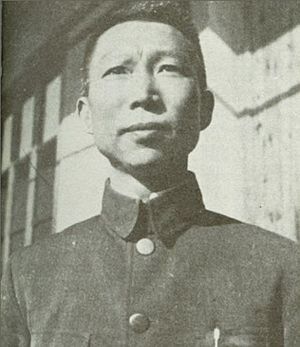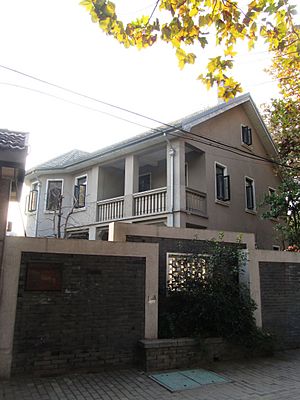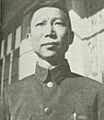Xue Yue facts for kids
Quick facts for kids
Xue Yue
|
|
|---|---|

Xue in 1938
|
|
| Native name |
薛岳
|
| Nickname(s) | Patton of Asia, Tiger of Changsha |
| Born | December 26, 1896 Shaoguan, Guangdong, Qing Empire |
| Died | May 3, 1998 (aged 101) Chiayi County, Taiwan |
| Allegiance | Republic of China |
| Service/ |
National Revolutionary Army |
| Years of service | 1914–1950 |
| Rank | General |
| Unit | 4th corps |
| Commands held | Commander-in-Chief of 9th war zone |
| Battles/wars |
|
| Awards | Order of Blue Sky and White Sun |
| Other work | Politician |
Xue Yue (Chinese: 薛岳; pinyin: Xuē Yuè; Wade–Giles: Hsüeh Yüeh; December 26, 1896 – May 3, 1998) was a Chinese Nationalist military general. He was nicknamed the "Patton of Asia" by Claire Lee Chennault of the Flying Tigers. The Chinese people also called him the "God of War" (戰神).
Contents
Early Life and Military Career

Xue Yue was born in Shaoguan, Guangdong, into a farming family. In 1909, he joined the Tongmenghui, a group that wanted to change China. He started his military training in 1912 at the Guangdong Military Primary School. Later, in 1917, he went to the Baoding Military Academy.
In 1918, Xue Yue left the academy to join an army led by Sun Yat-sen. He quickly became a commander. He even helped protect Sun Yat-sen's wife, Soong Ching-ling, during a conflict.
Xue Yue was a very skilled commander during the Northern Expedition. This was a major military campaign to unite China. After a political event in 1927, he briefly left the main army. He then joined the Guangdong 4th Army. His troops helped stop a Communist uprising in Guangzhou.
Later, during the Central Plains War, Xue Yue's army fought against Chiang Kai-shek. After a big defeat, his army had to join Chiang's side. Xue Yue was then promoted to lead the Guangdong 4th Army.
During the first part of the Chinese Civil War, Generalissimo Chiang Kai-shek ordered Xue Yue to fight the Chinese Communists. Xue Yue's forces chased the Communists during their Long March. He pushed them across vast areas of China. He also defeated famous Red Army commanders. Because of these successes, Chiang Kai-shek praised him as a great Chinese officer.
Fighting in World War II
After an event called the Xi'an Incident, some people questioned Xue Yue's loyalty. He had offered to arrest Chiang Kai-shek if he didn't agree to fight Japan. Even though they quickly made up, his relationship with the main Nationalist Party was sometimes difficult during the Second Sino-Japanese War.
Xue Yue led the 19th Army Group in the Battle of Shanghai. He also commanded forces in the Battle of Northern and Eastern Henan.
He was also a key leader in the Battle of Wuhan. In the mountains near Wuhan, Xue Yue's forces almost completely destroyed a Japanese division. The Japanese had to drop 300 officers by parachute to save their troops. This was a rare event in World War II.
Xue Yue was famous for his victories in the First, Second, and Third Battles for Changsha. His troops also won the Battle of Changde. However, they were defeated in the Fourth Battle of Changsha.
The Nationalist government and General Joseph Stilwell did not always support Xue Yue. They believed there was corruption in the army. But Claire Lee Chennault, who led the Flying Tigers, often supplied Xue Yue's soldiers with ammunition. Xue Yue's army also protected Chennault's airfields. Chennault and Xue Yue became very close friends.
Later Life and Retirement
After World War II, Xue Yue refused to exchange his gold for new paper money. He said his gold was earned with blood.
When Chiang Kai-shek moved to Taiwan in 1949, Xue Yue was put in charge of defending Hainan Island. However, the Communist Red Army defeated the Nationalist forces there. Xue Yue then moved to Taiwan.
In Taiwan, he served as an adviser, but it was mostly an honorary role. He was also the Master of Ceremony at Chiang Kai-shek's funeral in 1975. Xue Yue lived a very long life, passing away in 1998 at the age of 101.
Images for kids
See also
 In Spanish: Xue Yue para niños
In Spanish: Xue Yue para niños
 | Georgia Louise Harris Brown |
 | Julian Abele |
 | Norma Merrick Sklarek |
 | William Sidney Pittman |


